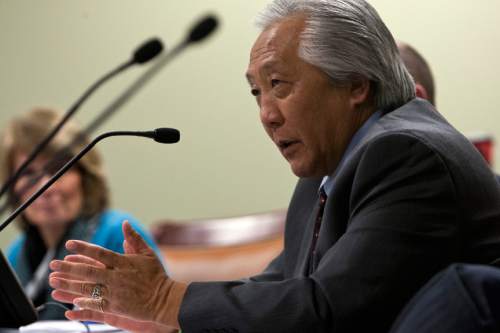This is an archived article that was published on sltrib.com in 2016, and information in the article may be outdated. It is provided only for personal research purposes and may not be reprinted.
Rep. Curt Oda, R-Clearfield, is proposing that Utah ban the most common forms of abortion — but the Legislature's lawyers warn that the bill likely would be unconstitutional.
Oda on Thursday introduced HB442 to abolish what it calls "dismemberment abortion," during which a doctor "deliberately and intentionally dismembers a living unborn child."
"To me, that's like desecrating a human being. If a human being dies, it's illegal to desecrate human remains. What's dismemberment? That's desecration. That's disgusting," Oda said.
The bill would outlaw using "suction to dismember the body of the unborn child by sucking fetal parts into a collection container," or using scissors or similar devices to "slice, crush or grab a portion of the unborn child's body in order to cut or rip the portion off."
The bill says that includes dilation and evacuation, suction and curettage, or suction aspiration.
However, the Legislature's lawyers attached a constitutional note to the bill, warning that "suction curettage and suction aspiration are generally the most common abortion procedures used to terminate pregnancies during the first trimester."
So, the attorneys warn, "there is a high probability that the [U.S. Supreme] court would find that the prohibition of those abortion procedures creates an undue burden on a woman's right to terminate her pregnancy before viability during the first trimester."
The American Congress of Obstetricians and Gynecologists has opposed similar bills around the country.
"Quite simply, these restrictions represent legislative interference at its worst: Doctors will be forced, by ill-advised, unscientifically motivated policy, to provide lesser care to patients. This is unacceptable," the group said in a statement.
"These legislative efforts are based on nonmedical, subjective language. This language will create confusion, thus putting women at risk and, in certain cases, actually leading to abortion later in pregnancy."
Kansas passed a similar "dismemberment abortion" ban last year, which resulted in a court battle. A state appeals court last month confirmed an earlier decision by a lower court that struck down that law.
Despite those hurdles, Oda said he still hopes for a hearing and action on his bill.
"Have you ever seen what the procedure for abortion looks like? It's disgusting," Oda said, explaining why he is proceeding.
Sen Curt Bramble, R-Provo, has said he is also working on a bill that would require anesthesia for a fetus during an abortion.
Gov. Gary Herbert said he opposes abortion, but is obligated to uphold the law.
"Whatever happens with the law, we'll enforce the law and abide by the Constitution," Herbert said. "I'm pro-life, I have a problem with Roe v. Wade, but it is the law of the land. I'll wait and see what [Oda's] bill is when it comes to my desk."
The Utah Department of Health reports that 2,948 abortions were performed in Utah in 2014, the most recent year for which data are available. Of those, 2,767 abortions were performed on Utah residents.
Those numbers are the lowest since at least 1977, even though the number of women ages 15 to 44 have doubled in those years.
Utah in 2014 had a rate of 4.3 abortions for every 1,000 women ages 15 to 44. That rate was 7.2 when the state first published the statistic in 1972, and reached a high of 11.1 in 1980.
Utah has one of the lowest abortion rates in the nation, according to the Centers for Disease Control and Prevention.
It had the sixth lowest rate among the states in 2012, the most recent year for which that data are available. Utah had a rate of 5.3 abortions per 1,000 women ages 15-44, compared to a national average then of 13.2. Mississippi had the lowest rate that year, at 3.6.
— Robert Gehrke contributed to this report.



